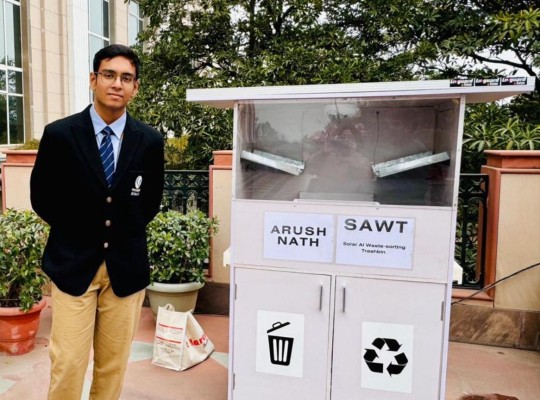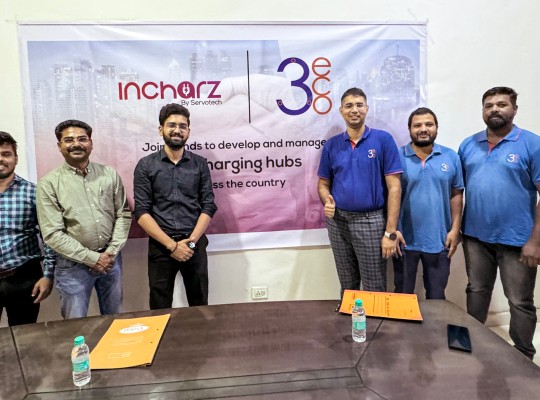With rapid urbanization, population growth, and changing consumption patterns, the world is grappling with an unprecedented surge in waste generation. Government data reveals that municipal areas in India generate a staggering 1,33,760 metric tonnes of municipal solid waste (MSW) daily, with only 91,152 tonnes collected and a mere 25,884 tonnes treated. One of the biggest challenges in treating waste is sorting and categorizing it effectively.
In a groundbreaking development, Arush Nath, a young student from Gurugram, has invented SAWT, the world’s first Solar-Powered AI Waste Sorting Bin. This innovative device automatically categorizes trash into recyclable or organic waste, offering a revolutionary solution to the global waste management crisis.
The Making of SAWT
Arush Nath’s journey began with a keen observation of towering landfills and a passion for sustainability. His interest in renewable energy and artificial intelligence deepened during summer programs where he learned about the urgent need for proper waste sorting. In the summer of 2022, he attended two summer programs – the Brown Solar Energy & Engineering Pre-college program and the Inspirit AI program. At Brown University, an Ivy League research university in Providence, Rhode Island, as he sat eating lunch in the cafeteria he noticed how students were chucking their trash into random dustbins in a hurry. As he delved into it deeper, he found that improper waste sorting is one of the causes of such huge landfills. This inspired him to create SAWT—a solution that integrates solar power and AI technology to automate the waste sorting process.
How SAWT Works
SAWT operates by leveraging the YOLO-v8 vision AI model, trained on over 45,000 images, to distinguish between recyclable and organic waste. Users simply deposit their trash into the bin without needing to sort it manually. The AI system identifies the type of waste and sorts it accordingly, streamlining the disposal process and reducing reliance on fossil fuels.
- Innovation: SAWT uses cutting-edge technology to categorize waste, representing a significant advancement in waste management.
- Sustainability: By harnessing solar energy, SAWT functions even in remote areas, addressing the pressing issue of waste mismanagement.
- Future Impact: SAWT minimizes mismanaged waste and reduces the carbon footprint of communities, promoting a cleaner, more sustainable future.
Broader Impacts and Future Potential
SAWT’s impact extends beyond waste management, serving as a catalyst for sustainable development. India ranks fourth in the world for mismanaged waste, with millions of tonnes ending up in landfills each year. SAWT addresses several Sustainable Development Goals (SDGs):
- SDG 11 (Sustainable Cities and Communities): By promoting cleaner, healthier urban environments.
- SDG 7 (Affordable and Clean Energy): By using solar energy, reducing reliance on traditional grid electricity and mitigating carbon emissions.
- SDG 12 (Responsible Consumption and Production): By minimizing mismanaged waste and fostering a circular economy.
By automating waste sorting, SAWT streamlines recycling processes and reduces the burden on overstretched landfill sites, paving the way for a more sustainable future.
Innovator Spotlight: Arush Nath
Arush Nath, a young student from Gurugram, has not only invented a groundbreaking technology but has also set an example for young innovators worldwide. His invention, the Solar-Powered AI Waste Sorting Bin (SAWT), is a testament to what can be achieved with passion and a drive for sustainability.
Arush’s vision was born from a simple yet profound observation: the need for better waste management systems. His dedication to solving this issue led him to blend his interests in renewable energy and artificial intelligence, resulting in a solution that addresses one of the most pressing environmental challenges of our time.
Arush’s story is one of innovation and hope, demonstrating that young minds can contribute significantly to solving global issues. His invention not only promises a cleaner, more sustainable future but also inspires others to pursue innovative solutions for a better world.












